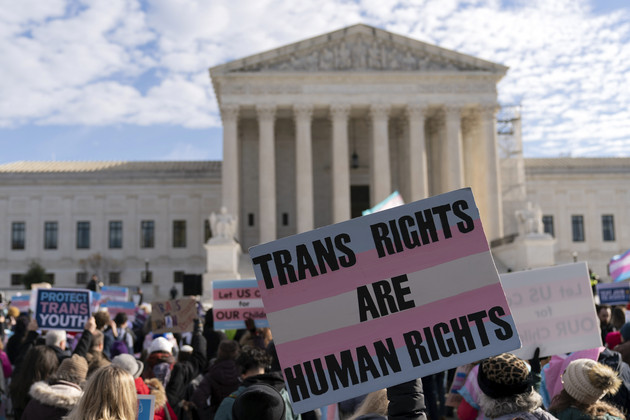
Wafric News – June 18, 2025
Washington, D.C. - In a deeply polarizing decision, the United States Supreme Court has upheld Tennessee’s controversial law banning gender-affirming medical care for transgender minors — a ruling expected to reverberate across conservative-leaning states already pursuing similar legislation.
Washington, D.C. - In a deeply polarizing decision, the United States Supreme Court has upheld Tennessee’s controversial law banning gender-affirming medical care for transgender minors — a ruling expected to reverberate across conservative-leaning states already pursuing similar legislation.
The 6-3 decision, delivered Wednesday by the court’s conservative majority, represents a decisive legal victory for proponents of stricter regulations on transgender-related health care and a significant setback for LGBTQ+ rights advocates. At its core, the case challenged Tennessee’s Senate Bill 1 (SB 1), which prohibits doctors from providing hormone therapies and puberty blockers to minors seeking gender transition-related care.
Chief Justice John Roberts, writing for the majority, framed the issue as a debate rooted in evolving science and policy. “The voices in these debates raise sincere concerns; the implications for all are profound,” he wrote. He added that the Equal Protection Clause of the Constitution does not resolve such complex disagreements, thus deferring more weight to the legislative process.
The court’s decision places such laws under the most deferential legal standard — known as rational basis review — effectively lowering the bar for similar legislation to be upheld in other states.
A Nation Divided
The ruling emerges at a politically charged time in the U.S., with over 20 states having introduced or enacted restrictions on transgender health care. It also follows broader shifts in American politics, where transgender rights have increasingly become a lightning rod for ideological battles.
The Biden administration, which initially led the legal challenge against Tennessee’s law, had argued that the statute amounted to unconstitutional sex discrimination. Government lawyers noted that while the law allows treatments like puberty blockers for conditions unrelated to gender identity, it bans the same medications when used for gender transition — a distinction they argued discriminates on the basis of sex.
Justice Sonia Sotomayor, one of the court’s three liberal justices, issued a sharply worded dissent from the bench — a rare move meant to underscore the gravity of her disagreement. “The court abandons transgender children and their families to political whims,” she declared. “In sadness, I dissent.”
She further warned that the ruling would do “irrevocable damage” to equal protection rights and set a precedent for lawmakers to disguise discriminatory laws as neutral public health policy.
Medical and Legal Ramifications
SB 1 not only bars gender-transition-related hormone therapy and puberty blockers for minors, but it also imposes civil penalties on providers who violate the law. Although surgical interventions were not part of this particular legal dispute, the statute also restricts such procedures for youth in Tennessee.
Supporters of the law argue that the legislation protects minors from making irreversible decisions at a vulnerable age. Tennessee Attorney General Jonathan Skrmetti, who defended the law in court, called the verdict “a common-sense victory” over what he described as judicial overreach. “This victory transcends politics,” he said, emphasizing what he believes is a science-based approach.
However, legal advocates, medical associations, and transgender rights groups condemned the decision. Chase Strangio, a lawyer with the American Civil Liberties Union who represented the plaintiffs, called the ruling a “devastating loss” for transgender people and their families.
Global and Diaspora Relevance
While this ruling is rooted in American jurisprudence, its implications resonate far beyond U.S. borders. Across Africa and within the global African diaspora, conversations around gender identity, human rights, and medical ethics continue to evolve — often within deeply conservative cultural frameworks.
Although most African countries have not legislated specifically on gender-affirming care for minors, the broader discourse on LGBTQ+ rights and bodily autonomy is gaining momentum, spurred in part by global rulings like this one. The decision may be cited or echoed in future debates over healthcare regulation, children's rights, and the limits of parental authority — both within and outside the United States.
Background and Broader Context
The legal battle began when three transgender youth in Tennessee, their parents, and a physician sued the state after SB 1 became law in 2023. The case climbed to the Supreme Court after conflicting rulings in lower federal courts and after President Donald Trump — recently re-elected — reversed the Biden administration’s position and withdrew federal support for the lawsuit.
The Supreme Court’s ruling was shaped in part by arguments over a 2020 precedent, Bostock v. Clayton County, in which the court found that discrimination against gay and transgender workers in employment violated federal civil rights laws. However, the majority in this case declined to apply Bostock to healthcare, contending that the law at issue here was based on age and medical purpose, not sex.
In a courtroom marked by solemnity and tension, Roberts read his majority opinion in a measured tone. Justice Sotomayor, in contrast, spoke for nearly 15 minutes, passionately warning of the potential consequences for vulnerable youth.
According to the Williams Institute at UCLA School of Law, over 110,000 transgender teenagers now live in states where similar restrictions on gender-affirming medical care are either in effect or pending.
As the legal and social terrain continues to shift, transgender youth and their families are left navigating not just personal struggles, but an increasingly politicized and uncertain future.
By WafricNews Desk.


Comment
To post a comment, you have to login first
LoginNo Comments Yet...